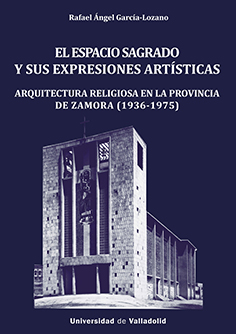THE SACRED SPACE AND ITS ARTISTIC EXPRESSIONS. RELIGIOUS ARCHITECTURE IN THE PROVINCE OF ZAMORA (1936-1975)
Keywords:
Contemporary religious architecture, applied arts, architectural reform, Modern Movement, Vatican Council II, Spain, ZamoraSynopsis
The purpose of this publication is the study, analysis, enhancement and dissemination of religious architecture and its associated plastic arts carried out in the province of Zamora between 1936 and 1975, not only in terms of the buildings constructed but also those that remained in the planning stage. This time span constitutes a period consolidated by historiography and sufficiently broad to observe the evolution experienced by religious architecture before and after the milestone of the Second Vatican Council (1962-1965) in the way it was conceived, as well as the changes that its regulations implied. Religious architecture occupied a position of singular relevance in Spanish architecture during the period covered by our study, both for the volume of works and for the quality of some of them, constituting -according to some specialists- the opportune circumstance for the restoration of modern architecture in Spain. The choice for this peripheral province has the vocation of bearing witness to the practice carried out in an ordinary way in any of the places of our country far from the architectural and ecclesiastical centers. This allows us to extrapolate its processes, decisions and consequences to other territories, offering us a broader and more objective panorama of religious architecture and its plastic arts during the central years of the last century. In this way we try to fill some gaps in the study of contemporary religious architecture, still focused almost exclusively on the most exceptional and paradigmatic architectures. And we will do so not only from an artistic and architectural consideration, but in an interdisciplinary way, considering also the functional, liturgical and pastoral values that underlie it, as well as other historical, cultural and economic conditioning factors that were even more decisive than the program itself. Despite the economic limitations, most of the architectures studied were fully framed in the Spanish context, and did so with more than acceptable results, including some of extraordinary relevance for their result or authorship.

Price
38.46 EURPublished
Right Holder
Ediciones Universidad de Valladolid y autor(es)/autora(s) 2022License

This work is licensed under a Creative Commons Attribution-NonCommercial-NoDerivatives 4.0 International License.

